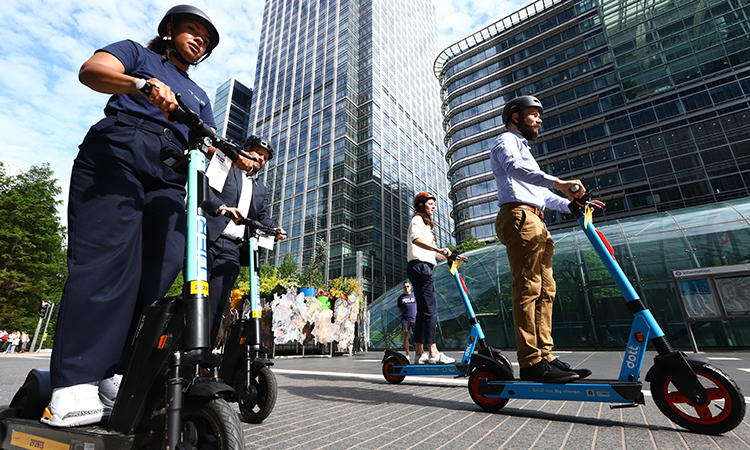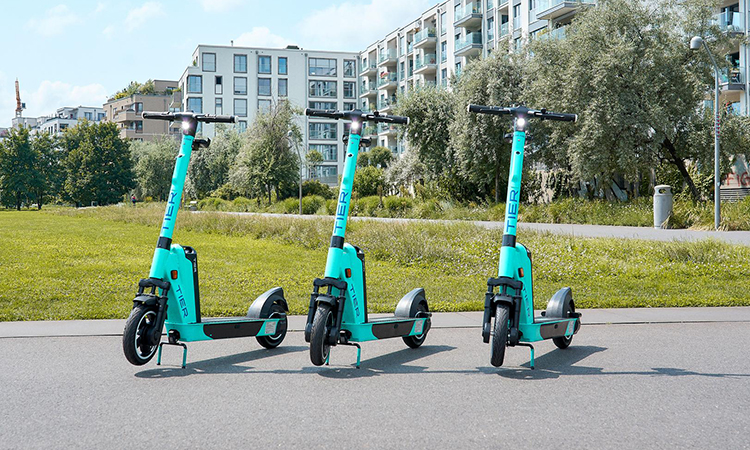Securing a brighter, safer and more sustainable future for the UK’s micro-mobility sector
- Like
- Digg
- Del
- Tumblr
- VKontakte
- Buffer
- Love This
- Odnoklassniki
- Meneame
- Blogger
- Amazon
- Yahoo Mail
- Gmail
- AOL
- Newsvine
- HackerNews
- Evernote
- MySpace
- Mail.ru
- Viadeo
- Line
- Comments
- Yummly
- SMS
- Viber
- Telegram
- Subscribe
- Skype
- Facebook Messenger
- Kakao
- LiveJournal
- Yammer
- Edgar
- Fintel
- Mix
- Instapaper
- Copy Link
Posted: 2 June 2022 | Georgia Yexley - TIER Mobility | No comments yet
As London’s e-scooter trial hits its first anniversary, and in light of its recent extension, TIER Mobility’s Georgia Yexley, General Manager UK & Ireland, reflects on the lessons learnt over the course of the past year and considers what will come next for micro-mobility in the UK.


Credit: TIER Mobility
This time last June (2021), the team at TIER Mobility were excitedly gearing up to introduce our e-scooters onto London’s roads as part of the Department for Transport’s (DfT) national trials. We were, and still are, incredibly proud to have been selected from reams of international operators to bring our experience in operating e-vehicles across Europe to London’s residents and tourists.
Since then, Transport for London (TfL) has not only decided to extend the trial by another six months to November 2022 – marking a big vote of confidence for micro-mobility – but the UK government has announced that it will soon introduce legislation to expand the legal use of e-scooters. Throughout these trials, the UK has undergone huge changes – with COVID-19, the cost of living and the omnipresent threat of climate change causing major shifts in how people live and travel.
As we look ahead to a new regulatory environment and take into account the shifts in society that we have seen in the last year, we are keen that all of our learning, research and data is informing the upcoming legislation. While we engage with the industry and government through various forums, steering committees and workshops, we also believe that the public need to hold the very same information and role in guiding what comes next. So, what are our key takeaways after a year in the capital – and what’s next for micro-mobility in the UK?


Credit: Transport for London – Georgia Yexley (TIER Mobility), Mayor Philip Glanville (London Councils), Helen Sharp (Transport for London) and Duncan Robertson (Dott) on e-scooters.
A desire to travel more sustainably
First, the appetite for green transport in London – and across the UK – is clearly evidenced. Londoners have travelled hundreds of thousands of miles using TIER e-scooters since the start of the trial. A recent survey that we carried out found that Brits would prefer to reduce their carbon footprint by using greener modes of transport to get around cities rather than eating less meat or taking fewer flights. When asked what actions they would take to cut their carbon footprint in 2022, 38 per cent said switching to greener transport, with 28 per cent specifically choosing to switch to e-bikes or e-scooters.
Tackling deep-rooted travel behaviours and attitudes
But a key learning from us is that people are still, ultimately, creatures of habit, and encouraging them to ditch their cars and switch to more sustainable modes of transport is not as simple as introducing the vehicles to UK streets and expecting people to instantly change how they travel. Over a recent Bank Holiday weekend in London, we saw e-scooter usage increase by 55 per cent compared to the weekend before. This shows that people want to use green transport – but it might still be seen as something that you’d do on a day off, and not as part of your daily routine. To truly make inroads in changing how people move around their cities, we need political will and the right frameworks in place to encourage widespread, sustained behaviour change.


Credit: TIER Mobility
Government support is vital
The signal from the government that they do plan to legalise, and thereby regulate, e-scooters is crucial; it’s a sign for consumers that e-scooters are here to stay, and it’s a green light for innovators and operators who can begin planning and investing for the long term with more confidence. Alongside regulatory frameworks, we need the right physical infrastructure to encourage people to change their travel habits. Improved cycle paths and denser networks of dedicated parking spaces can make micro-mobility a more reliable, available and, therefore, attractive option. We need only to look at the growth in London’s cycling network over the past few years, which has helped to fuel record numbers of cyclists – 42 per cent of journeys in the capital are now carried out by cycling or walking; representing impressive progress towards TfL’s goal of 80 per cent of trips to be made by walking, cycling and public transport.
Avoiding a car-led recovery
During the height of the pandemic and lockdowns, there were fewer people driving, and more people walking, cycling and remote working. But, instead of everyone going back to a car-dominant mindset now that the worst of the pandemic seems to be over, going forward, we should be building our towns and cities to maintain and encourage behaviour change through enabling the choice of active travel.
Industry collaboration and partnerships
Perhaps the major takeaway from our year of operations in London is the importance of partnership. We are extremely proud of the collaborative approach that we have taken as an operator. Whether it’s our work with TfL, London Councils, each of the participating Boroughs and London’s other rental scheme operators; with apps like Flare, which helps riders to report road hazards in real-time; or with the social enterprises such as Safe & the City, to research barriers for female riders. Linked by our shared ambition to make sustainable transport a truly viable option for Londoners – operators, authorities and innovators have been working together to deliver convenient, sustainable, safe transport options.


Credit: TIER Mobility
Safety
Safety is the priority for all e-scooter operators, and for the government when developing e-scooter regulations – we have brought this to the heart of our partnership approach in working with the experts. For example, we are working with researchers at University College London’s (UCL) world-leading PEARL Lab, other London operators and charities for people affected by sight loss, like the Thomas Pocklington Trust, to develop a sound for e-scooters to alert blind and partially-sighted people to their approach. We will, collectively, implore the government to design regulation with the needs of vulnerable pedestrians and road users at its heart, in line with the approach of London’s e-scooters.
Looking to the future
As we continue our operations across the city, we’re excited for what the remainder of the trial brings. In another year’s time, we are confident that we will see e-scooters further integrated into the UK’s urban transport mix, enabling people outside of the capital and right across the country to benefit from a mode of transport that is sustainable, has low barriers to access and is, at its core, safe and inclusive for all.
Now in her second micro-mobility company with Unicorn status, Georgia Yexley, General Manager for UK & Ireland at TIER Mobility, has worked in partnership with hundreds of cities across the globe to reach their active and sustainable transport goals through micro-mobility. A firm believer that collaboration and partnership underpin sustainable services, Yexley is responsible for commercial performance, rider experience and community impact. Alongside this, she is a passionate advocate for inclusion and accessibility, and contributes to raising the volume of women and underrepresented groups in technology and mobility both in and outside of the workplace.
Related topics
Accessibility, Air Quality, Alternative Power, COVID-19, Mobility Services, Passenger Experience, Sustainable Urban Transport, Transport Governance & Policy, Vehicle & Passenger Safety
Related modes
Bikes & Scooters
Related cities
London
Related countries
United Kingdom
Related organisations
Department for Transport (DfT), London Councils, Transport for London (TfL), UK Government, University College London
Related people
Georgia Yexley








